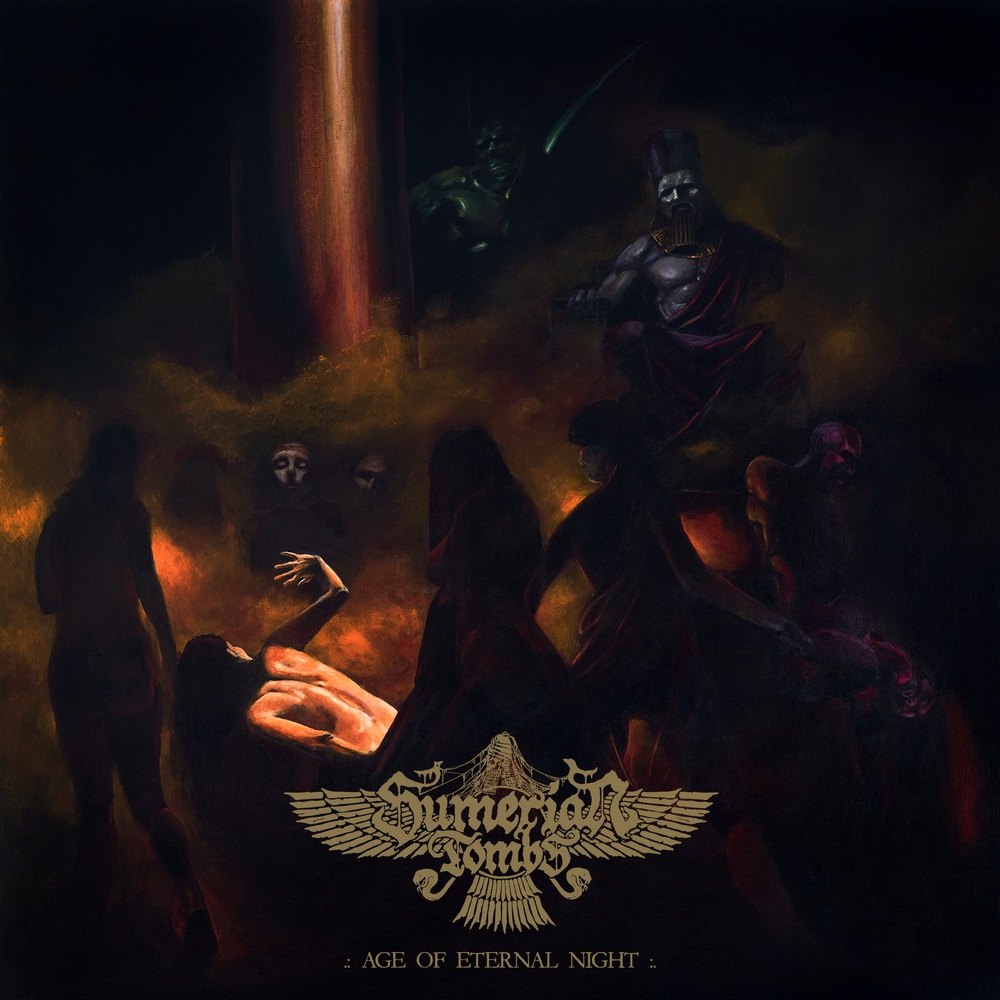
When Sumerian Tombs emerged from the German city of Cologne in 2021, a veil of mystery still surrounded its members. Who exactly was behind this pitch-black, archaic-sounding black metal remained unclear at the time. Since then, some details have come to light: it is now known that Wiborg, the seasoned vocalist of Heimdalls Wacht, also handles vocal duties in this band. That alone hints at a certain level of experience and conviction—Sumerian Tombs is anything but a side project thrown together by newcomers who ordered their gear from Thomann the week before rehearsals began.
On the contrary, the members have already earned their stripes in both the metal and punk scenes of Cologne and its surroundings, and those roots can be clearly heard in their uncompromising sound and deliberate aesthetic.
Following a highly praised debut album released in 2022 via the esteemed Ván Records, the band is now gearing up for their second full-length. Expectations are high, not least because their first record was lauded for its raw energy, suffocating atmosphere, and impressively cohesive thematic vision.
Where many black metal bands drown in abstract nihilism or generic misanthropy, Sumerian Tombs digs deeper. Despite hailing from a city that began its history as a Roman colony—Colonia Claudia Ara Agrippinensium—the band turns instead to a much older cradle of civilization for inspiration: Mesopotamia.
This choice of the ancient land between the rivers is far from a superficial aesthetic decision. Between the banks of the Euphrates and the Tigris, a civilization once flourished that not only gave rise to the first system of writing but also fostered a mythological tradition that continues to captivate to this day. It is that mythology—brimming with gods of chaos, astronomical symbolism, rituals, and apocalyptic visions—that serves as the thematic backbone of Sumerian Tombs’ music. And they channel it with conviction: the atmosphere they summon is ritualistic, ominous, and steeped in a sense of existential awe toward the mysteries of the past.
Musically, the band operates within the realm of classic second wave black metal, albeit with a perspective of their own. Drawing influence from the Scandinavian tradition as well as a slightly more dramatic atmosphere, they craft a soundscape that is both aggressive and immersive. There is room for melody, but never as an ornament to please the listener. Everything serves the ritual—the evocation of a forgotten world that still trembles beneath the surface of the modern age.
While the LP version of Sumerian Tombs’ new album features eight tracks, it’s well worth considering the CD edition, which includes no fewer than four bonus tracks—adding nearly 22 extra minutes of music. That’s a substantial extension for those who want to fully immerse themselves in the dark world the band conjures here. Whether these bonus tracks conceptually align with the central theme of the album isn’t entirely clear, but they certainly enrich the overall experience.
One track in particular stands out: “The Dawn”, which diverges notably in tone and atmosphere. With its brooding mood and melodic sensibility, it leans toward new wave or even gothic rock—reminiscent of Fields of the Nephilim. The comparison is apt, not only musically but thematically as well, since that British band also drew inspiration from Sumerian mythology. The nod feels both deliberate and fitting.
The album proper kicks off with the ferocious and unrelenting “Edimmu Rising”, a powerful opener that instantly sets the tone for what proves to be an intense and uncompromising release. The title refers to the Edimmu, vengeful spirits from Sumerian underworld lore, and that ominous energy is palpable from the first note: razor-sharp riffs, furious blast beats, and vocals that feel more like ritual incantations than traditional singing. It’s a gripping introduction, dragging the listener into a realm where the supernatural and the ancient are one and the same.
Next comes “Naamah – Temptress of the Night”, which initially slows the pace but loses none of its intensity. Naamah, often described as the demonic ‘angel’ of prostitution and seduction, is portrayed through hypnotic rhythms and slow-burning tension. The track combines crushing, measured passages with occult melodies that build a sense of dark allure—perfectly capturing the essence of its namesake.
Another highlight is the highly atmospheric “The Seal – Blood Meditation”, a track that stands out due to its depth and layered composition. Subtle eastern-inspired synth lines hover over the mix like a spectral mist—never overpowering, but always present. This ethereal quality runs throughout the entire album, reinforcing the Mesopotamian identity in a way that feels natural rather than forced. These aren’t token ‘oriental’ samples, but carefully woven textures that enhance the thematic weight of the music.
With this album, Sumerian Tombs delivers a carefully balanced work that blends fury, mysticism, and melancholy in impressive fashion. The production is raw yet textured, the arrangements are deliberate and evocative.
By embracing not just aggression but also atmosphere and mythic resonance, this second full-length marks a significant evolution for the band. The bonus tracks add a surprising, even esoteric dimension to the whole, making the CD edition essential for those eager to delve deeper into the shadowed realm of the Sumerian underworld
90/100
Sumerian Tombs:
Bandcamp
Facebook
Instagram
Ván Records:
Website
Bandcamp
Instagram
Facebook

